Skirmish Cancellation
Skirmish Cancellation is an informal game term referring to the phenomenon of cancelling skirmishes. When a skirmish is cancelled, there is no skirmish resolution: no winner, no loser. All characters are unassigned and do not have an opportunity to be assigned to new skirmishes until the next assignment phase (provided there is one), unless a card's game text provides such an opportunity. From Fellowship block to Movie block skirmish cancelling waned in availability for Shire, the culture with the most access to it and the largest driver of its use overall. It regained popularity thanks to No Visitors (15C150)
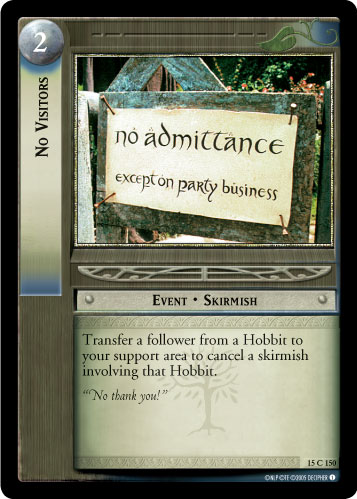 and Halfling Leaf (17U106)
and Halfling Leaf (17U106)
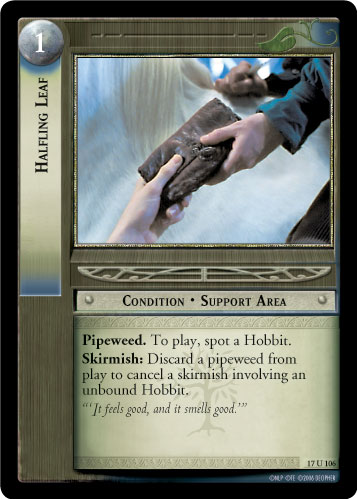 cards in Standard and Expanded, the only formats in which decks can be built to reliably handle skirmishes by cancelling them all game long.
cards in Standard and Expanded, the only formats in which decks can be built to reliably handle skirmishes by cancelling them all game long.
Skirmish Cancelling is used primarily to avoid losing the skirmish and having companions wounded or killed: Hobbits and Smeagol typically have 3 strength without any equipment and are often at risk of being overwhelmed if they have to skirmish. However, there may be other reasons to wish to cancel a skirmish. If an opponent has effects that trigger off of winning a skirmish, such as The Pale Blade (1R221)
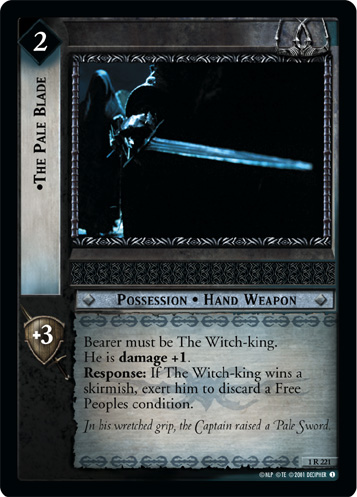 or Goblin Swarms (1R183)
or Goblin Swarms (1R183)
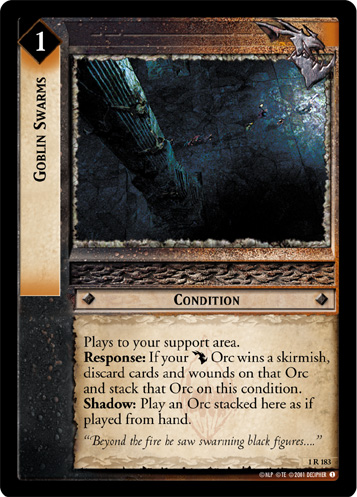 , the Free Peoples player may go out of their way to cancel what would otherwise be manageable losses. Because the Free Peoples player takes the first action, skirmish cancelling can deprive a Shadow player of taking any skirmish actions at all. Úlairë Cantëa, Lieutenant of Dol Guldur (1R230)
, the Free Peoples player may go out of their way to cancel what would otherwise be manageable losses. Because the Free Peoples player takes the first action, skirmish cancelling can deprive a Shadow player of taking any skirmish actions at all. Úlairë Cantëa, Lieutenant of Dol Guldur (1R230)
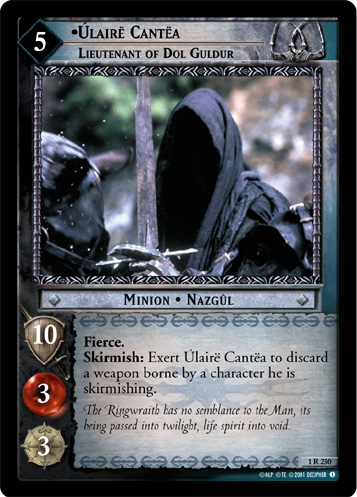 can wreak long-term havoc by disarming a Fellowship, even if it winds up losing every skirmish -- if only given the opportunity.
can wreak long-term havoc by disarming a Fellowship, even if it winds up losing every skirmish -- if only given the opportunity.
Race Across the Mark (4R168)
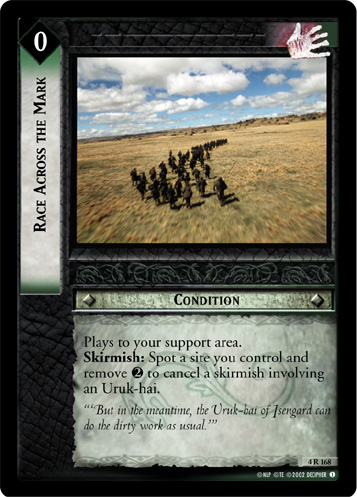 provides the only avenue for the Shadow player to cancel skirmishes (though the assignment cancelling from Return to Its Master (1R224)
provides the only avenue for the Shadow player to cancel skirmishes (though the assignment cancelling from Return to Its Master (1R224)
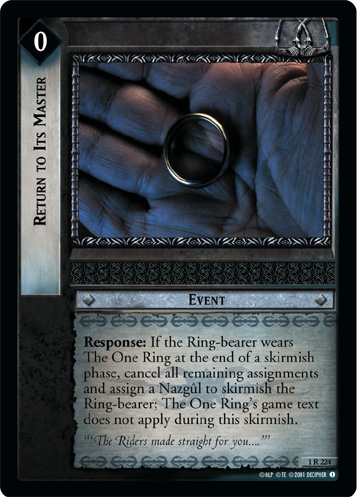 generally provides the same result - see Removing Characters below). The Uruk Trooper (4R199)
generally provides the same result - see Removing Characters below). The Uruk Trooper (4R199)
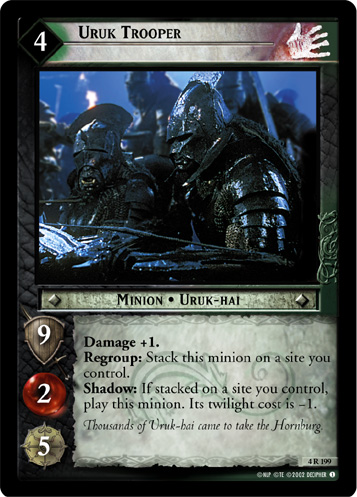 family of minions most directly benefit, able stack themselves on a site and potentially set up a swarm later. Several
family of minions most directly benefit, able stack themselves on a site and potentially set up a swarm later. Several Isengard trackers and
Uruk-hai hunters are much stronger in fierce skirmishes (e.g., Uruk Plains Runner (4C189)
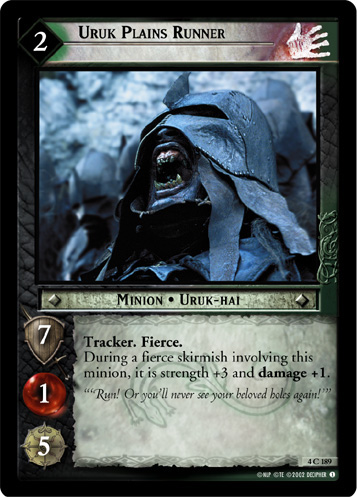 and Pursuing Uruk (15C167)
and Pursuing Uruk (15C167)
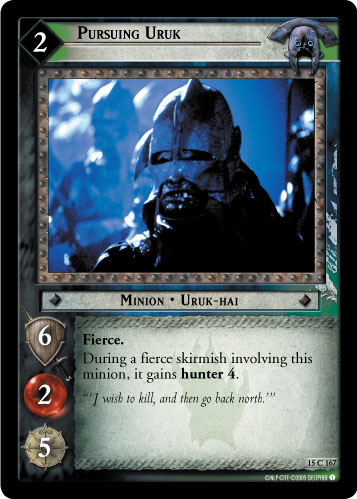 ), and cancelling the first is one way to keep them alive long enough for their text to kick in. Aside from these specific usages, allowing any minion to avoid a skirmish that would kill it means the Free Peoples will have a much harder time ever moving twice. Realistically though, the setup and cost of using the card outweigh most benefits -- if the Shadow player is able to control a site, they must have already been able accomplish these things (winning skirmishes or minions surviving until the regroup phase) without spending the extra twilight.
), and cancelling the first is one way to keep them alive long enough for their text to kick in. Aside from these specific usages, allowing any minion to avoid a skirmish that would kill it means the Free Peoples will have a much harder time ever moving twice. Realistically though, the setup and cost of using the card outweigh most benefits -- if the Shadow player is able to control a site, they must have already been able accomplish these things (winning skirmishes or minions surviving until the regroup phase) without spending the extra twilight.
Skirmish Cancelling by Format
Fellowship
Skirmish Cancelling is a large part of the meta here, for several reasons. First and foremost is the presence of Hobbit Stealth (1C298)
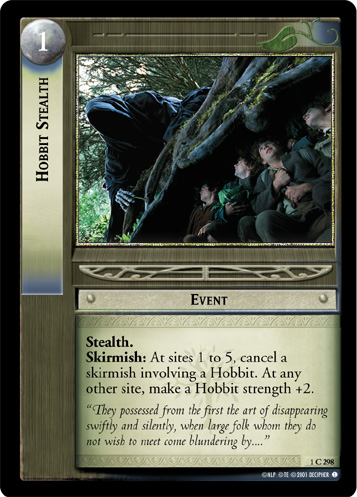 and Hobbit Intuition (1C296)
and Hobbit Intuition (1C296)
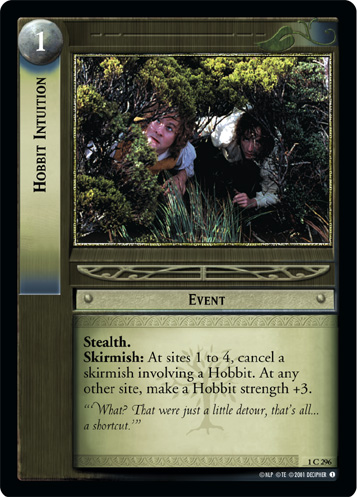 . Though they appear rather plain, they are among the most efficient skirmish events in the game: for a Hobbit with 3 strength, there is often no more better possible outcome than cancelling the skirmish completely. Barring that, just +2 strength is a substantial increase and offers even more protection from being overwhelmed than an effect that raises the overwhelm multiplier such as Bounder (1C286)
. Though they appear rather plain, they are among the most efficient skirmish events in the game: for a Hobbit with 3 strength, there is often no more better possible outcome than cancelling the skirmish completely. Barring that, just +2 strength is a substantial increase and offers even more protection from being overwhelmed than an effect that raises the overwhelm multiplier such as Bounder (1C286)
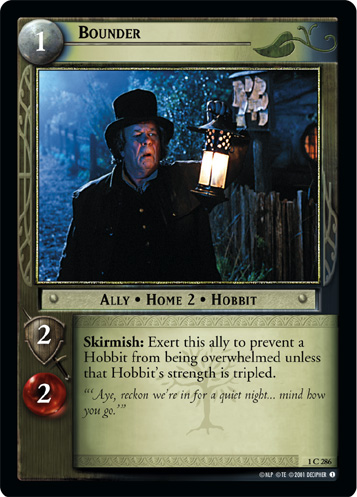 (A 5 strength Hobbit requires a 10 strength foe to overwhelm normally, a 3 strength Hobbit protected by Bounder requires only 9 strength). Any and every deck can benefit from them, so until site 6 the Shadow player must be weary of skirmishes involving a Hobbit being cancelled regardless of the Free Peoples' overall strategy. Second, The Bridge of Khazad-dûm (1C349)
(A 5 strength Hobbit requires a 10 strength foe to overwhelm normally, a 3 strength Hobbit protected by Bounder requires only 9 strength). Any and every deck can benefit from them, so until site 6 the Shadow player must be weary of skirmishes involving a Hobbit being cancelled regardless of the Free Peoples' overall strategy. Second, The Bridge of Khazad-dûm (1C349)
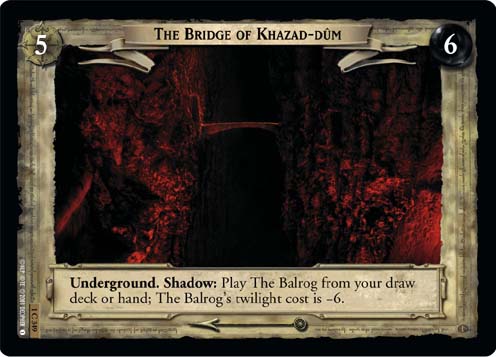 requires that every deck have a "Balrog contingency plan." Cancelling its skirmish is typically more realistic than getting a companion up to 18 strength to win the skirmish and more desirable than allowing companions to be wounded or killed. Third, Filibert Bolger, Wily Rascal (2C101)
requires that every deck have a "Balrog contingency plan." Cancelling its skirmish is typically more realistic than getting a companion up to 18 strength to win the skirmish and more desirable than allowing companions to be wounded or killed. Third, Filibert Bolger, Wily Rascal (2C101)
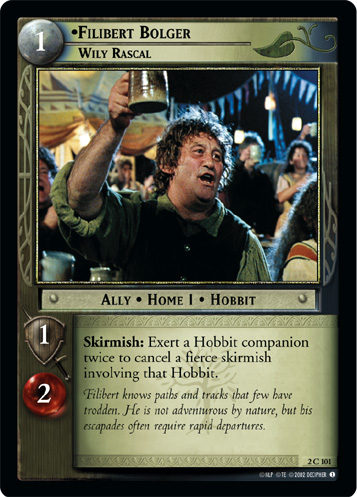 and O Elbereth! Gilthoniel! (2R108)
and O Elbereth! Gilthoniel! (2R108)
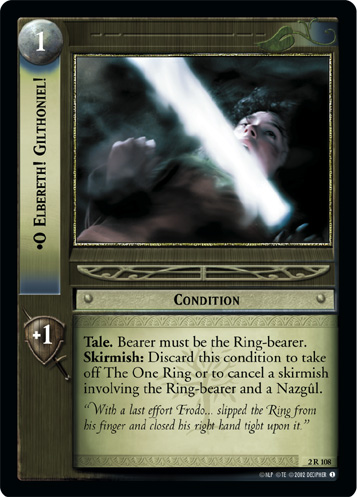 allow a reliable way out of otherwise insurmountable odds, especially at site 9 when the Fellowship has been worn thin and The Ring-bearer is assigned to skirmish minions many times stronger than himself.
allow a reliable way out of otherwise insurmountable odds, especially at site 9 when the Fellowship has been worn thin and The Ring-bearer is assigned to skirmish minions many times stronger than himself.
While Hobbits are the main driver of skirmish cancelling regardless of format, Gandalf's Staff (2R22)
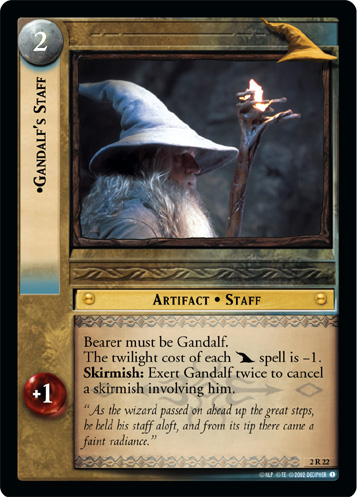 is noteworthy for being the only permanent and reliable way for a character other than a Hobbit or Smeagol to cancel skirmishes until Erkenbrand's Shield (18R97)
is noteworthy for being the only permanent and reliable way for a character other than a Hobbit or Smeagol to cancel skirmishes until Erkenbrand's Shield (18R97)
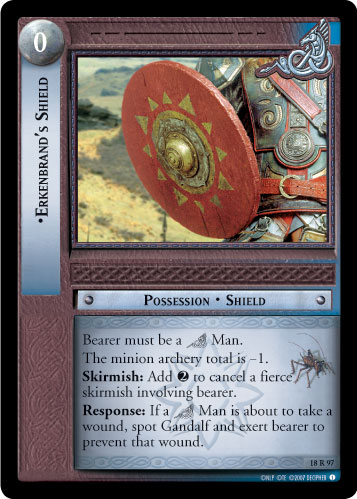 was released in the last regular set.
was released in the last regular set.
Towers
While it has a place, skirmish cancelling is less Towers site path than it was in Fellowship block; all of the factors that led it to prominence in Fellowship turned against it. Hobbit Stealth / Hobbit Intuition were ruled to only cancel skirmishes on the Fellowship block site path, and the two successor events (Severed His Bonds (4C319)
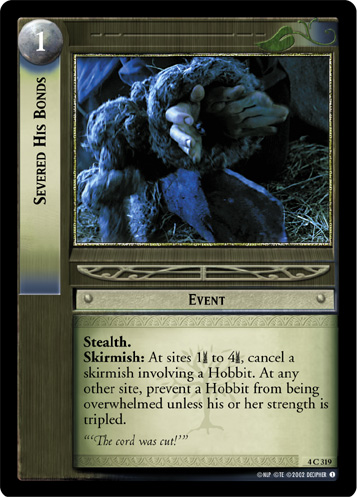 and Swiftly and Softly (4C321)
and Swiftly and Softly (4C321)
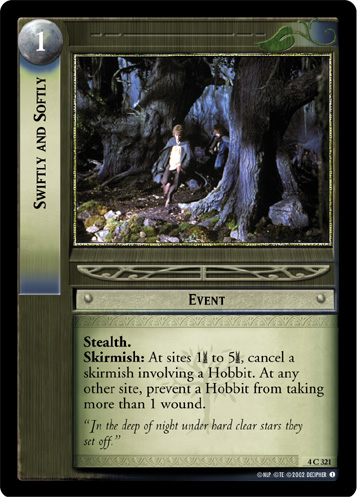 ) offer very little once they can't cancel skirmishes anymore. Rather than risk drawing dead cards in the last sites when the opponent's Shadow side is often at its strongest, most players simply didn't include them. Without a reliable big threat like The Balrog, players had no reason to plan for losing skirmishes at any particular point in time. Filibert Bolger and O Elbereth! Gilthoniel! were banned with the introduction of the X-list shortly after the release of set 4. A few new skirmish cancelling cards were added, though the most played of them - Escape (4R300)
) offer very little once they can't cancel skirmishes anymore. Rather than risk drawing dead cards in the last sites when the opponent's Shadow side is often at its strongest, most players simply didn't include them. Without a reliable big threat like The Balrog, players had no reason to plan for losing skirmishes at any particular point in time. Filibert Bolger and O Elbereth! Gilthoniel! were banned with the introduction of the X-list shortly after the release of set 4. A few new skirmish cancelling cards were added, though the most played of them - Escape (4R300)
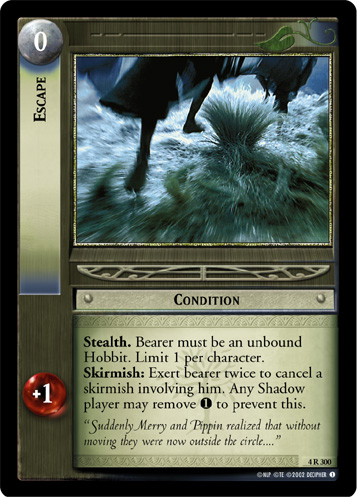 and Frodo's Cloak (4R303)
and Frodo's Cloak (4R303)
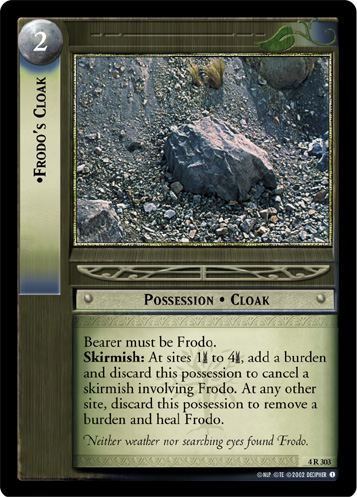 - are primarily used for their other functions (vitality and burden removal/healing, respectively). In short, cancelling skirmishes happens much less often and is much more predictable. Towers is also the only format without a competitive Hobbit-only deck, though they still tend to make up a majority in Legolas, Dauntless Hunter (4R73)
- are primarily used for their other functions (vitality and burden removal/healing, respectively). In short, cancelling skirmishes happens much less often and is much more predictable. Towers is also the only format without a competitive Hobbit-only deck, though they still tend to make up a majority in Legolas, Dauntless Hunter (4R73)
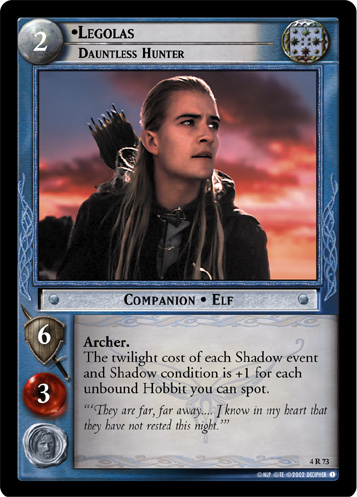 and Smeagol, Stinker
and Smeagol, Stinker
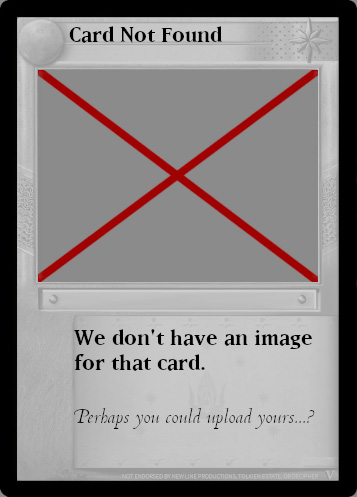 decks.
decks.
Men gained access to skirmish cancelling in this block with Curse Them (4C113)
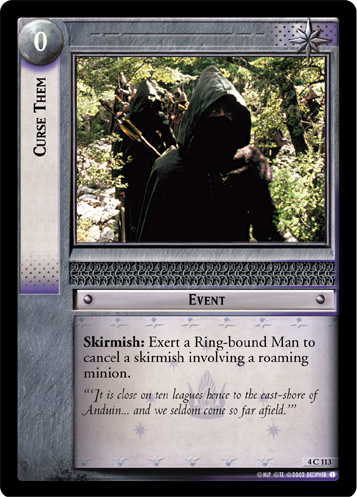 , Boromir's Gauntlets (4C112)
, Boromir's Gauntlets (4C112)
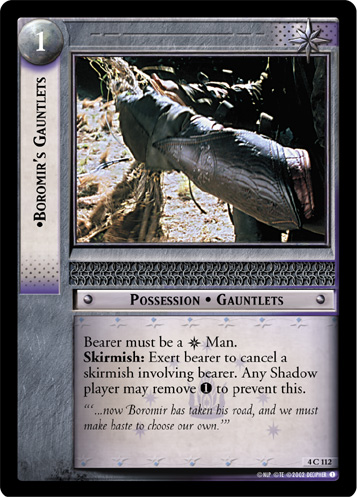 , and Rohirrim Helm (5R89)
, and Rohirrim Helm (5R89)
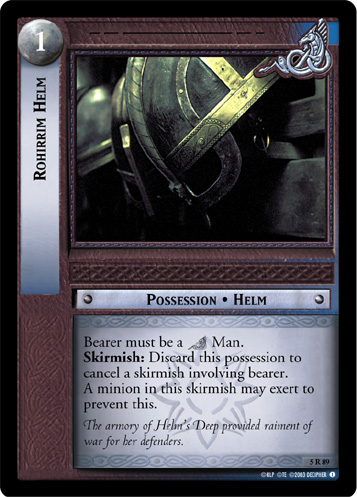 . However, because these companions are also typically the strongest skirmishers they are less popular -- by and large, deck space spent on cancelling skirmishes is better spent on cards to win them.
. However, because these companions are also typically the strongest skirmishers they are less popular -- by and large, deck space spent on cancelling skirmishes is better spent on cards to win them.
King
Sets 7 and 8 saw even fewer opportunities to cancel skirmishes, and there was no real successor to Severed His Bonds / Swiftly and Softly -- only A Fool (8C14)
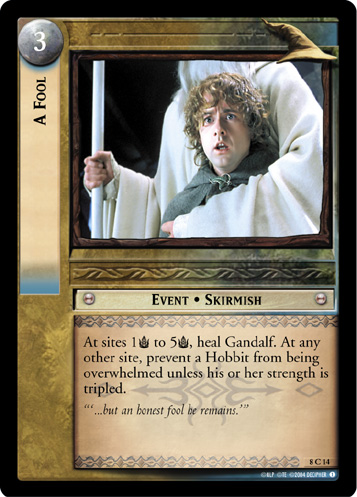 . In the Standard format of The Return of the King and Siege of Gondor, the only way to cancel the Ring-bearer's skirmish was Curse Them (4C113)
. In the Standard format of The Return of the King and Siege of Gondor, the only way to cancel the Ring-bearer's skirmish was Curse Them (4C113)
 . Tom Bombadil, The Master (9R+52)
. Tom Bombadil, The Master (9R+52)
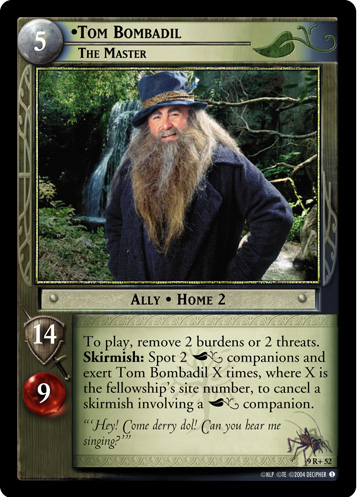 from Reflections appeared to fill the void, but a rules change accompanied the set's new Alternate Ring-Bearers which forbid the Ring-bearer's skirmish from being cancelled altogether. Filibert Bolger and O Elbereth! Gilthoniel! were removed from the X-list as a result (the only time previously banned cards were allowed again without a change in the site path), but by the end of King Block most Hobbits didn't have to rely on cancelling skirmishes to survive anymore. Everyone Knows (9R50)
from Reflections appeared to fill the void, but a rules change accompanied the set's new Alternate Ring-Bearers which forbid the Ring-bearer's skirmish from being cancelled altogether. Filibert Bolger and O Elbereth! Gilthoniel! were removed from the X-list as a result (the only time previously banned cards were allowed again without a change in the site path), but by the end of King Block most Hobbits didn't have to rely on cancelling skirmishes to survive anymore. Everyone Knows (9R50)
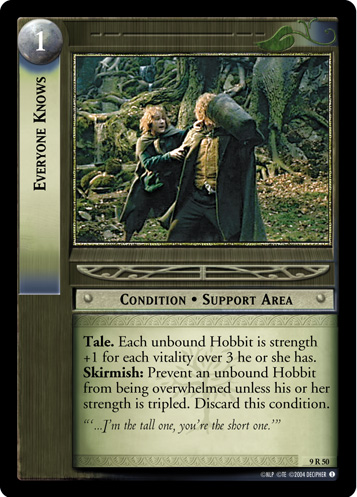 had alleviated much of the need to cancel skirmishes for Merry and Pippin while Sam, Great Elf Warrior (10P122)
had alleviated much of the need to cancel skirmishes for Merry and Pippin while Sam, Great Elf Warrior (10P122)
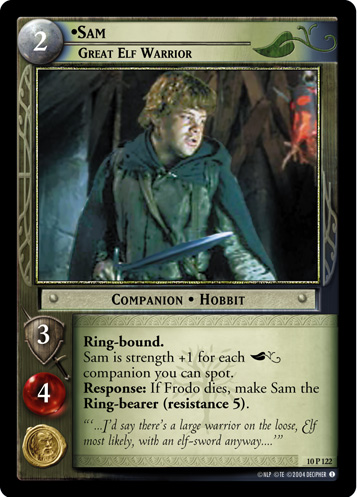 , the game's strongest version of Sam, was released in Mount Doom. A somewhat controversial substitute to skirmish cancelling, The Tale of the Great Ring (10U116)
, the game's strongest version of Sam, was released in Mount Doom. A somewhat controversial substitute to skirmish cancelling, The Tale of the Great Ring (10U116)
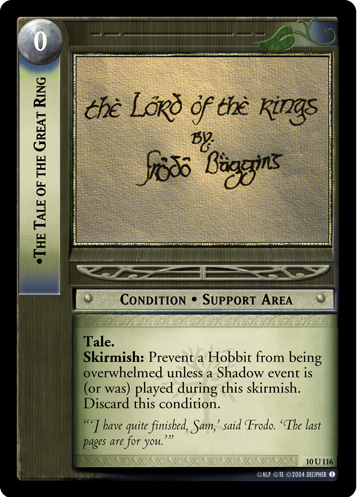 , picks up any remaining slack, particularly for Frodo who is virtually unkillable through wounds thanks to The One Ring. The result of it all is that skirmish cancelling is more readily available than it was in Towers, but less needed than ever before.
, picks up any remaining slack, particularly for Frodo who is virtually unkillable through wounds thanks to The One Ring. The result of it all is that skirmish cancelling is more readily available than it was in Towers, but less needed than ever before.
Shadows and Beyond
War of the Ring Block brought the most changes to the game than any set before with the "Standard" format split into two halves: the Decipher-preferred Standard, which introduced set rotation, and the player-preferred Expanded. With each new set released, the oldest set was made illegal in Standard -- set 12 rotated out set 2, which dropped all three skirmish cancelling cards remaining from Fellowship block. The skirmish cancelling cards introduced were weak at best, and the mechanic seemed sure to become an occasional gimmick rather than anything of importance. Then set 15 ushered in Hunters Block and No Visitors (15C150)
 . A two-card combo with Daddy Twofoot, Next-door Neighbor (13U144)
. A two-card combo with Daddy Twofoot, Next-door Neighbor (13U144)
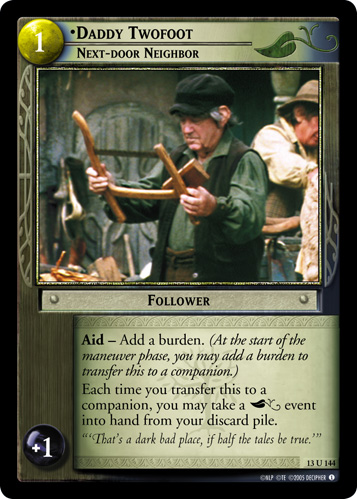 allows the Free Peoples player to reliably dodge a skirmish every turn. Bilbo, Aged Ring-bearer (13R142)
allows the Free Peoples player to reliably dodge a skirmish every turn. Bilbo, Aged Ring-bearer (13R142)
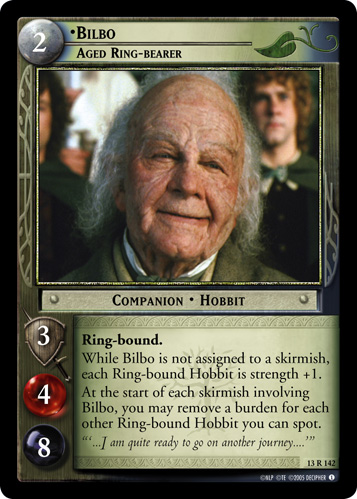 knocks off the cost (often removing an extra burden as well) so that players need nothing else to do it every turn, though sometimes Bilbo, Melancholy Hobbit (12R119)
knocks off the cost (often removing an extra burden as well) so that players need nothing else to do it every turn, though sometimes Bilbo, Melancholy Hobbit (12R119)
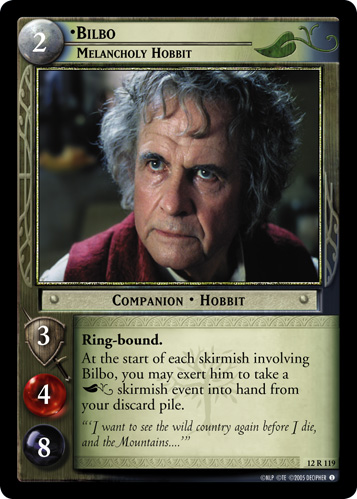 is preferred to pull back the same event twice per turn (once by Daddy Twofoot in the maneuver phase and once by Bilbo in his skirmish) while other components of the deck handle the burdens and wounds (two of the Shire culture's greatest strengths). Halfling Leaf (17U106)
is preferred to pull back the same event twice per turn (once by Daddy Twofoot in the maneuver phase and once by Bilbo in his skirmish) while other components of the deck handle the burdens and wounds (two of the Shire culture's greatest strengths). Halfling Leaf (17U106)
 is even more reliable for unbound Hobbits, particularly in Expanded where it is able to discard Fellowship block pipeweed possessions to cancel skirmishes. With both No Visitors and Halfling Leaf, a Hobbit deck may only ever have to plan on what to do if the Ring-bearer is assigned to a skirmish (see Replacing Characters below).
is even more reliable for unbound Hobbits, particularly in Expanded where it is able to discard Fellowship block pipeweed possessions to cancel skirmishes. With both No Visitors and Halfling Leaf, a Hobbit deck may only ever have to plan on what to do if the Ring-bearer is assigned to a skirmish (see Replacing Characters below).
Related Concepts
Removing Characters
Removing a character from the current skirmish does not cancel it -- if the Free Peoples character or all minions are removed, the other side wins (removed characters are neither winning nor losing characters). However, if all characters from one side of a skirmish are removed before a skirmish begins, that skirmish never occurs and neither side wins or loses. In this case, the assignment is what becomes effectively cancelled -- a very similar result to cancelling the skirmish for whichever characters remain. Shadow players have a much greater opportunity to participate in removing characters than cancelling skirmishes, often by killing/discarding their own minions but occasionally by doing the same to Free Peoples characters.
This began as something restricted to the Free Peoples in Fellowship block. Gimli's Battle Axe (1R14)
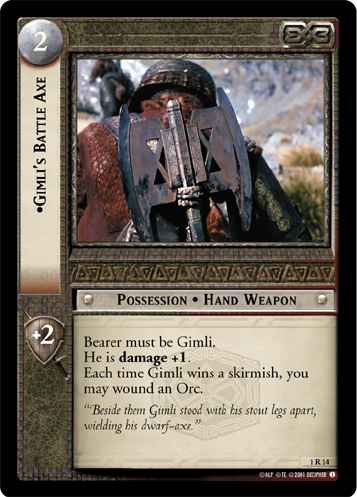 and Long Knives of Legolas
and Long Knives of Legolas
 offered protection against swarms by allowing Gimli or Legolas to wound minions assigned to Frodo (or anyone else) after they win their own skirmishes, hopefully killing it. The events Dismay Our Enemies (2U17)
offered protection against swarms by allowing Gimli or Legolas to wound minions assigned to Frodo (or anyone else) after they win their own skirmishes, hopefully killing it. The events Dismay Our Enemies (2U17)
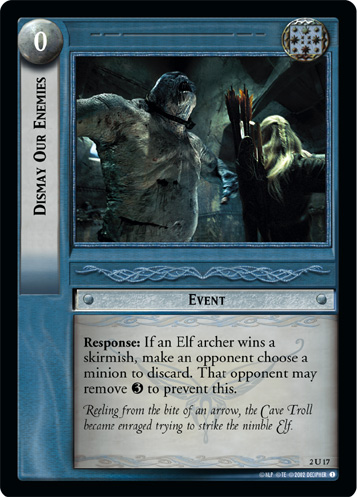 , Staff Asunder (2R27)
, Staff Asunder (2R27)
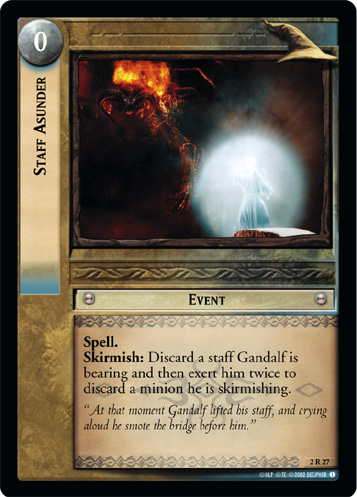 , and Flee in Terror (2U33)
, and Flee in Terror (2U33)
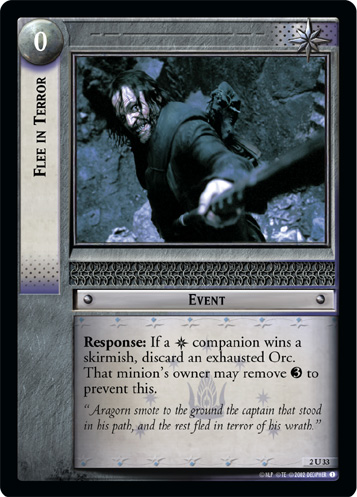 allow minions to be discarded directly, though somewhat unreliably.
allow minions to be discarded directly, though somewhat unreliably.
With decreased support for skirmish cancelling in Towers came a new concept: discarding companions, specifically Merry and Pippin. The text on each Towers version of these characters discards them, though only Merry, Learned Guide (4C310)
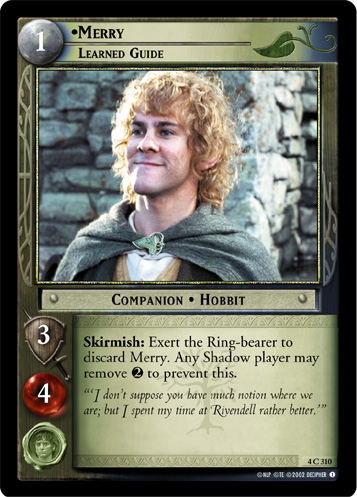 and Pippin, Woolly-footed Rascal (4C314)
and Pippin, Woolly-footed Rascal (4C314)
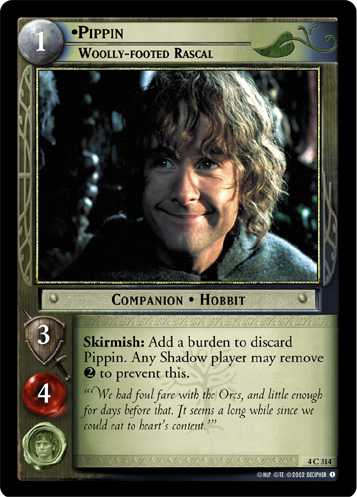 are able to do it while assigned to a skirmish. Warmed Up a Bit (4C322)
are able to do it while assigned to a skirmish. Warmed Up a Bit (4C322)
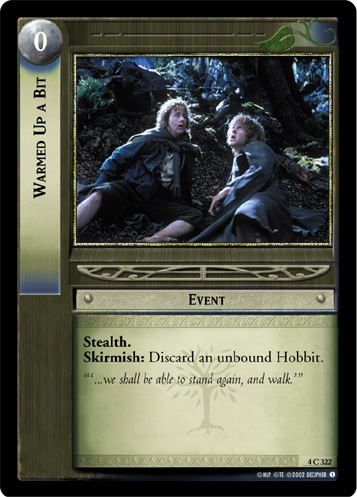 may be used with any copy of them to get out of a skirmish, while Knocked on the Head (4C308)
may be used with any copy of them to get out of a skirmish, while Knocked on the Head (4C308)
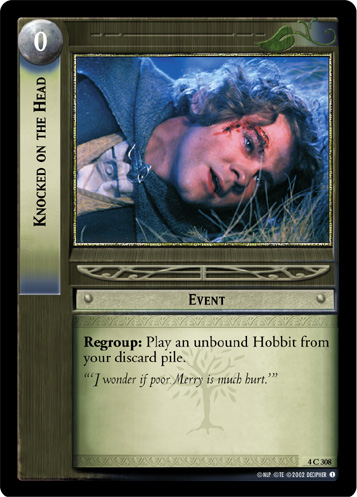 , Treebeard, Earthborne
, Treebeard, Earthborne
 , and Gandalf, Greyhame (4R89)
, and Gandalf, Greyhame (4R89)
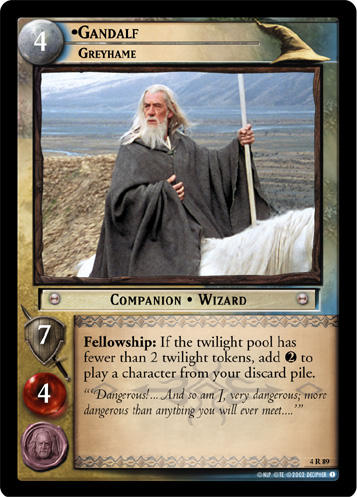 offer more reliable ways to pull them back than hoping to draw another copy. Merry, Unquenchable Hobbit (4R311)
offer more reliable ways to pull them back than hoping to draw another copy. Merry, Unquenchable Hobbit (4R311)
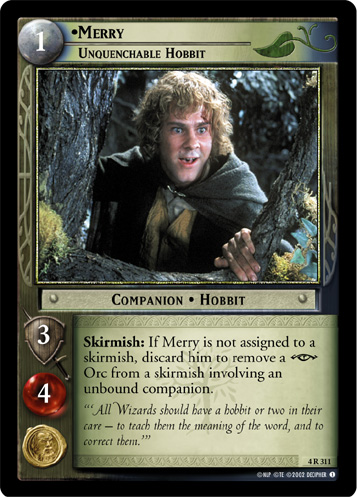 and Pippin, Just a Nuisance (4R313)
and Pippin, Just a Nuisance (4R313)
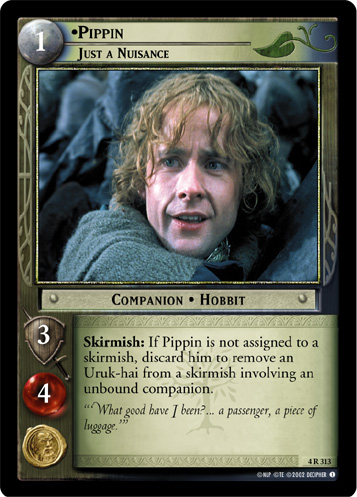 provide the a way for the Free Peoples player to remove a minion from a skirmish without killing or discarding it. Return to Its Master (1R224)
provide the a way for the Free Peoples player to remove a minion from a skirmish without killing or discarding it. Return to Its Master (1R224)
 and Mordor Assassin (7R284)
and Mordor Assassin (7R284)
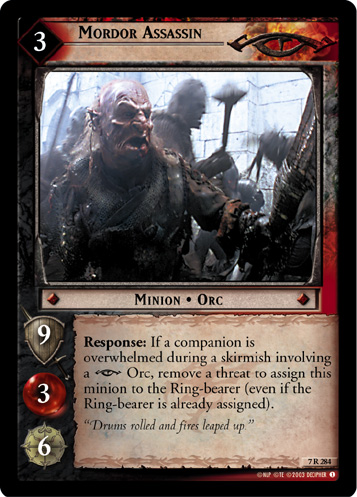 are the only other ways that skirmishes may not happen without being cancelled or having one side killed/discarded, and can impact skirmishes that haven't started yet.
are the only other ways that skirmishes may not happen without being cancelled or having one side killed/discarded, and can impact skirmishes that haven't started yet.
The introduction of threats in King block allowed players to take advantage of removing characters in a new way. Sometimes the thing that the Free Peoples player is trying to accomplish is not to prevent their character from being wounded or killed, but prevent a particular minion from being able to win a skirmish -- namely when there are response actions or triggers such as Goblin Swarms (1R183)
 or War Club (4U36)
or War Club (4U36)
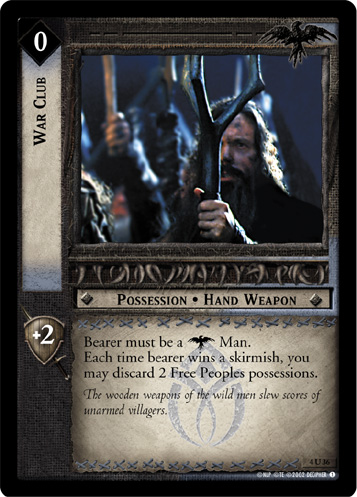 around. By allowing (or being forced to) kill a companion in one skirmish, a second may be killed by threat wounds. While certainly a heavy blow to lose two or more companions in a single skirmish, it is often less painful than allowing an opponent to take advantage of these effects -- particularly when the companions were going to die in their skirmishes anyway.
around. By allowing (or being forced to) kill a companion in one skirmish, a second may be killed by threat wounds. While certainly a heavy blow to lose two or more companions in a single skirmish, it is often less painful than allowing an opponent to take advantage of these effects -- particularly when the companions were going to die in their skirmishes anyway.
While there are a few Shadow cards that allow players to discard or kill other minions mid-skirmish, the Free Peoples decides skirmish order which is a big impediment to getting a ton of value. If a Shadow player might benefit from discarding a minion before its skirmish (e.g., using Orc Cutthroat (5U104)
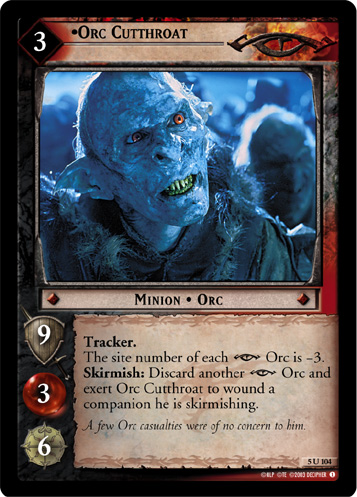 to discard an Orc that will be killed in its skirmish anyway), the Free Peoples player can often simply resolve those skirmishes first. The lurker keyword solves this by forcing lurker skirmishes to be resolved last, allowing for cards such as Column of Easterlings (11C72)
to discard an Orc that will be killed in its skirmish anyway), the Free Peoples player can often simply resolve those skirmishes first. The lurker keyword solves this by forcing lurker skirmishes to be resolved last, allowing for cards such as Column of Easterlings (11C72)
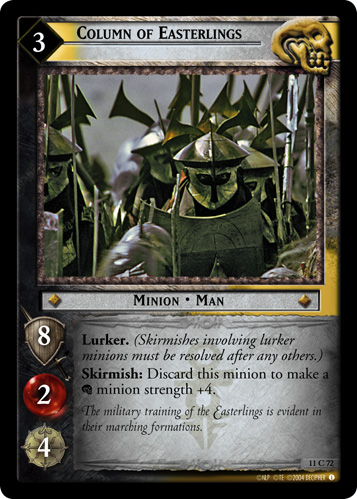 to potentially have an impact. However, lurker was only on cards from War of the Ring block and is very limited in scope as a result.
to potentially have an impact. However, lurker was only on cards from War of the Ring block and is very limited in scope as a result.
Replacing Characters
Like Towers before it, King Block offered another new way to get out of a skirmish. This time, by allowing certain companions to take the place of the companion currently skirmishing. Counts But One (8U4)
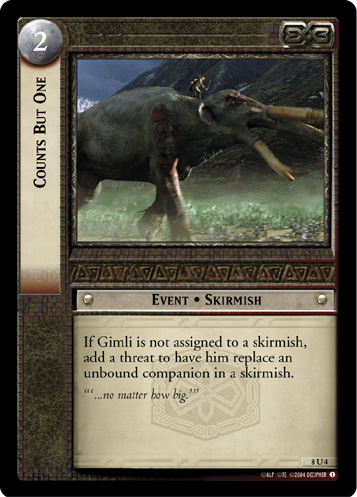 , Mighty Steed (8U17)
, Mighty Steed (8U17)
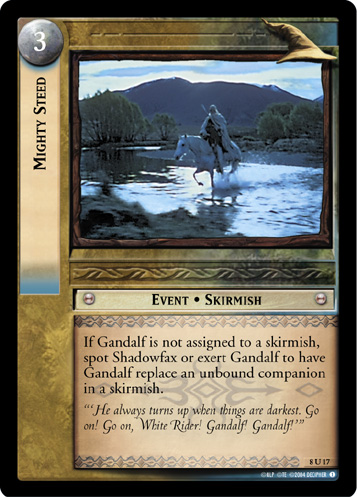 , and Brave and Loyal (10U105)
, and Brave and Loyal (10U105)
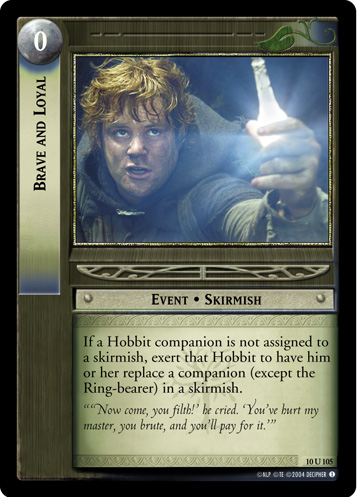 gave Gimli, Gandalf, and any Hobbit the ability to fight in the place of other companions. While the skirmish still occurs, allowing these companions to "fight twice" can save the replaced character from certain death. Typically these are used so a strong companion wins two skirmishes, but they may also let an expendable companion be wounded or killed and save a more important character from the same fate. The concept was expanded in later formats, most notably in Pippin, Brave Decoy (11R170)
gave Gimli, Gandalf, and any Hobbit the ability to fight in the place of other companions. While the skirmish still occurs, allowing these companions to "fight twice" can save the replaced character from certain death. Typically these are used so a strong companion wins two skirmishes, but they may also let an expendable companion be wounded or killed and save a more important character from the same fate. The concept was expanded in later formats, most notably in Pippin, Brave Decoy (11R170)
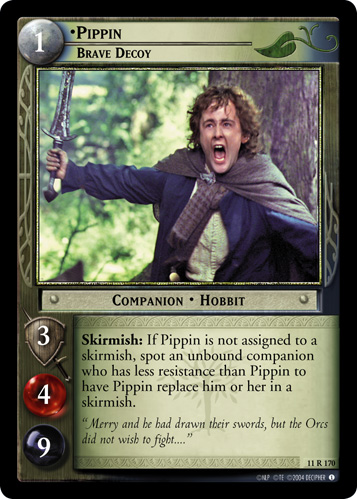 able to do it at essentially no cost, Guardian (12U50)
able to do it at essentially no cost, Guardian (12U50)
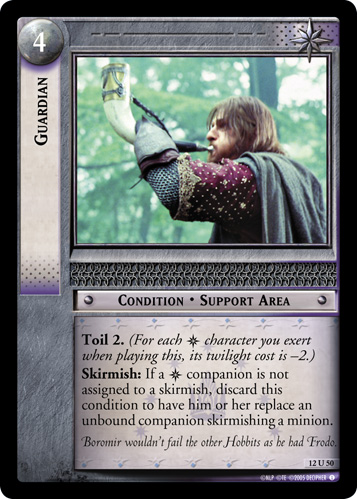 opening up access to
opening up access to Gondor, and Frodo, Frenzied Fighter (13R149)
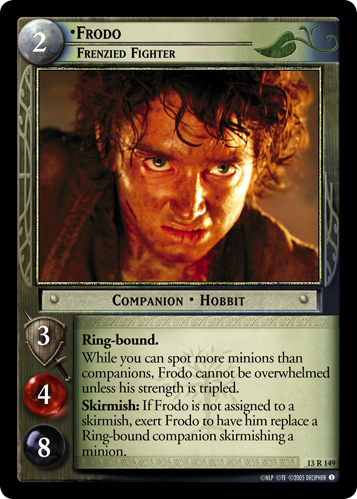 - the only non-Ring-bearer version of Frodo - capable of replacing the Ring-bearer in a skirmish.
- the only non-Ring-bearer version of Frodo - capable of replacing the Ring-bearer in a skirmish.
Importantly, cancelling a skirmish and replacing a character are not exclusive. Pippin can be assigned to skirmish a minion, cancel the skirmish with Halfling Leaf (17U106)
 , replace another companion, and then cancel *that* skirmish as well. If the other companion has a sufficiently large defender bonus, this may constitute the entirety of the skirmish phases for the site (with just one opportunity for the Shadow player to act, after the Free Peoples uses Pippin's ability). While The Ring-bearer's skirmish cannot be cancelled in Movie block and beyond, Frodo, Frenzied Fighter's skirmish can -- and because he can replace the Ring-bearer, it is possible for a Hobbit deck to cancel every single skirmish all game long regardless of the original assignments.
, replace another companion, and then cancel *that* skirmish as well. If the other companion has a sufficiently large defender bonus, this may constitute the entirety of the skirmish phases for the site (with just one opportunity for the Shadow player to act, after the Free Peoples uses Pippin's ability). While The Ring-bearer's skirmish cannot be cancelled in Movie block and beyond, Frodo, Frenzied Fighter's skirmish can -- and because he can replace the Ring-bearer, it is possible for a Hobbit deck to cancel every single skirmish all game long regardless of the original assignments.